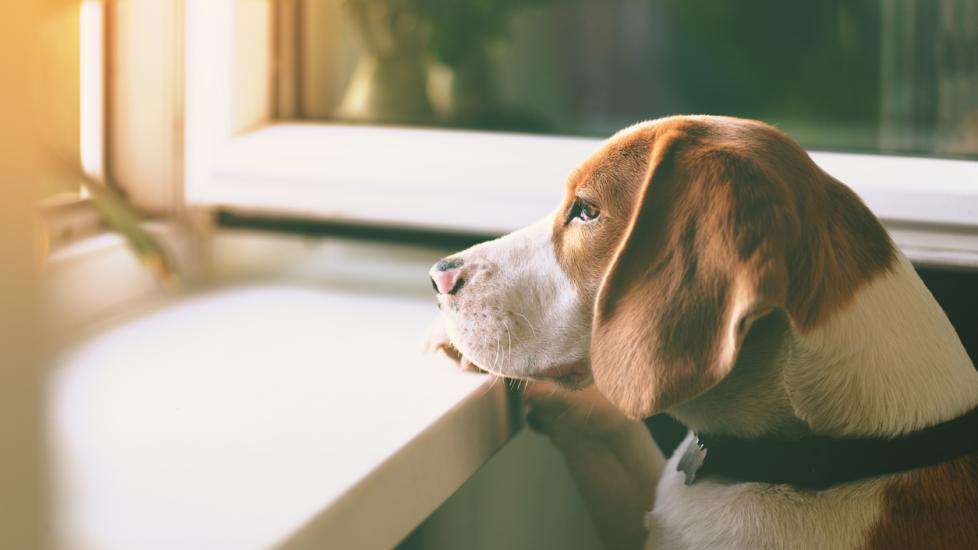Can Benadryl Help With Dog Anxiety?
While some sources of dog stress are chronic in nature, such as separation anxiety, many are temporary and situational. Thunderstorms, fireworks, and even holiday gatherings can be stressful for dogs.
For these short-lived events, what can a pet parent do to help their anxious dog?
With good intentions, pet parents may rummage through their own medicine cabinets for potential solutions. Perhaps you have done so yourself and you’ve wondered if Benadryl can calm dogs. If so, you are not alone.
But is Benadryl safe for dogs? Can Benadryl ease a dog’s anxiety? These are questions I often hear as a veterinarian.
The answer isn’t a simple yes or no—it’s a little more complicated than that. Here’s what you need to know about using Benadryl for dogs and what you need to be careful of.
Can You Use Benadryl to Calm Dogs?
Benadryl is sometimes referred to by healthcare professionals by its generic name, diphenhydramine.
It’s an antihistamine, meaning that it acts to stop or prevent allergic reactions. For this reason, Benadryl is often used for the treatment of environmental allergies and allergic reactions to insect bites and bee stings.
Benadryl is also used to decrease the severity of or prevent vaccine reactions. Occasionally, Benadryl is helpful for mild motion sickness, though it is infrequently effective for this purpose.
But what about using Benadryl for dog anxiety? You may have heard that Benadryl can be used as a sedative to calm your dog while traveling or during fireworks or thunderstorms.
It’s true that Benadryl may alleviate symptoms for some dogs, but the sedative effects are mild and not nearly as pronounced in dogs as they are in people.
So overall, Benadryl is not commonly helpful for dogs struggling with anxiety or phobias.
Shop Toys, Training and More
Alternatives for Treating Dog Anxiety
If Benadryl’s not the answer for dog anxiety, what can you do? Work with your veterinarian to determine ways to decrease your dog’s anxiety depending upon the trigger. Here are a few helpful options that they might suggest to ease your dog’s stress.
Dog-Appeasing Pheromones
One OTC option that some dog owners have great success with is DAP (dog-appeasing pheromone).
These synthetic pheromones may induce relaxation and help modify your dog’s behaviors. They are available in many forms, including sprays, plug-in diffusers, and even collars, a personal favorite of mine.
Dog Anxiety Vests and Head Halters
Dog anxiety vests, mats that reduce static (for thunderstorm phobias), and head halters may help to calm your dog further.
Noise Machines and Music
For noise-induced anxiety, try to provide background sounds from the radio or television.
Music with a lot of constant drumbeats, such as rap, usually helps. Don’t turn the music up loud; instead provide a constant distracting rhythm to focus your dog’s attention on the music instead of the triggering noise.
Using white noise apps can help alleviate noise-induced phobias as well.
Prescription Medications
Prescription medications can be very helpful in the majority of dogs struggling with fearful or anxious behaviors.
Maintain a Calm, Supportive Demeanor
Never punish your dog for their anxious behaviors (or in general). This means physically or by yelling or reprimanding him for things like chewing, digging, or eliminating in the house.
Here are some anxious behaviors your dog may exhibit:
-
Elevated heart rate
-
Panting
-
Trembling
-
Pacing
-
Loss of bladder or bowel control
-
Hiding or fleeing
-
Lowering their body and tucking their ears close to their head
-
Opening their eyes wider than usual
-
Curling their tail close to their body
-
Showing defensive aggression
-
Destructive behaviors, such as chewing and digging excessively
Remember that punishment for any behavior will only worsen anxiety in dogs. Instead, help to calm your dog and always reward them when they respond positively to things that usually cause anxiety.
In general, a dog’s anxiety will be lessened when their owner is calm, patient, and in control.
Featured Image: iStock.com/Tetiana Garkusha
